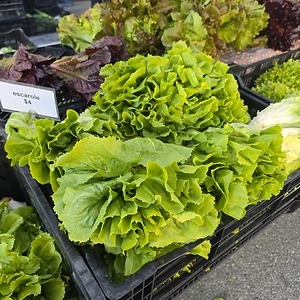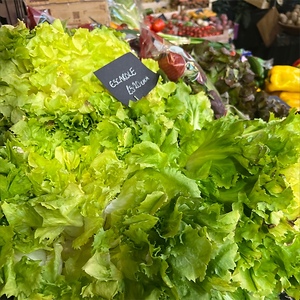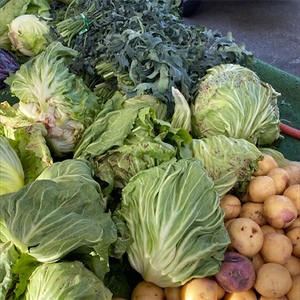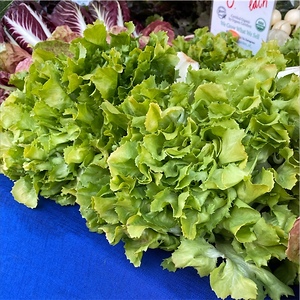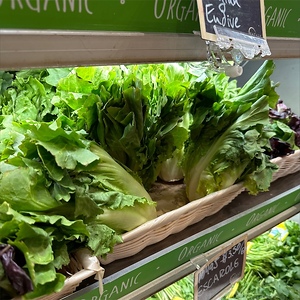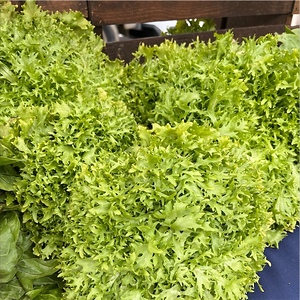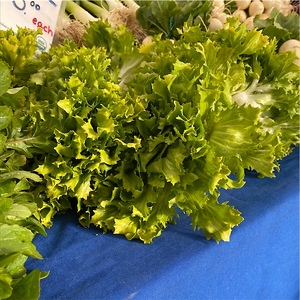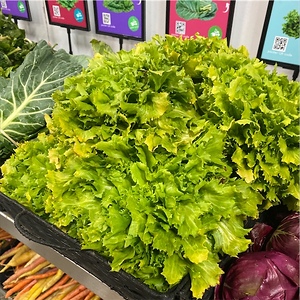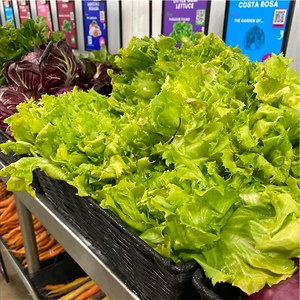


Escarole
Estimated Inventory, 24 ct : 2.58
This item was last sold on : 07/29/25
Description/Taste
Escarole varies in size, depending on maturity at harvest and growing conditions, and develops in a flattened rosette averaging 30 to 55 centimeters in diameter. The leaves form from a shared central base at the bottom of the rosette and are broad, curved, and wavy. Each leaf features a prominent, thick central midrib, and the rest of the leaf’s surface is pliable, crinkled, and textured. Escarole leaves vary in color based on their growing process. If blanched, the exterior leaves will have dark green hues, while the interior leaves showcase white to pale yellow shades. The leaves have jagged, serrated edges and a crisp, crunchy, lightly chewy, and semi-firm consistency. Younger leaves at the heart of the rosette are the most tender, with a delicate succulent crunch. Cooked leaves will also soften in texture. Escarole is edible raw or cooked and has a vegetal, mildly bitter, green, and subtly nutty flavor.
Seasons/Availability
Escarole is available year-round, with a peak season in the spring and summer.
Current Facts
Escarole, botanically classified as Cichorium endivia var. latifolia, is a type of endive belonging to the Asteraceae family. Many varieties of Escarole are grown worldwide, and the greens are most prevalently used as a culinary ingredient, favored for their mildly bitter nature. Escarole is also known as Batavian Broad Leaf, Scarola or Scariola in Italy, and Scarole in France, and is a low-growing crop forming loose rosettes. When the plants are almost mature, the leaves are typically tied up in bunches to shield the plant’s interior from sunlight, a process known as blanching. Blocking sunlight allows Escarole greens to maintain a milder and less bitter flavor, and the interior leaves develop a pale green, yellow, and white hue. If left to grow in full sun, the leaves would become dark green and develop a bitter, often unpalatable taste. In the modern day, Escarole has varying reputations, from a common leafy green in some markets to a specialty green sold for its flavor and sturdier texture. Escarole is commercially grown worldwide for culinary use, and the greens are sought after by chefs and home cooks for use in raw and cooked dishes.
Nutritional Value
Escarole is a source of vitamins A, C, and K to maintain healthy organs, strengthen the immune system, and aid the body in faster wound healing. The greens also provide minerals such as calcium, phosphorus, iron, potassium, and copper. Calcium and phosphorus support bones and teeth, while iron helps to develop the protein hemoglobin for oxygen transport through the bloodstream. Potassium balances fluid levels within the body, and copper assists the body in producing red blood cells. Other nutrients include fiber to regulate the digestive tract, folate to develop tissues, and antioxidants to support the overall health of the body and reduce inflammation.
Applications
Escarole has a mildly bitter, vegetal, and green flavor suited for fresh and cooked preparations. The greens range in bitterness, depending on their growing conditions, and are commonly torn raw into salad mixes. Escarole is often used in mesclun, a blend of greens with varying flavors. The greens are also tossed in light vinaigrettes, stuffed into sandwiches, or used as a bed for roasted meats. Larger escarole leaves can be used as a wrap in place of bread or carb-heavy ingredients. In addition to fresh preparations, Escarole holds its structure well when heated and can stand up to braising, simmering, roasting, and sautéing. The greens can be added to soups and stews, cooked with aromatics as a simple savory side, or cooked into a quiche. Escarole is also stirred into pasta, eaten with fish dishes, or added to risotto. In Italian recipes, Escarole is popularly cooked with beans and served over crusty bread or cooked into minestra maritata, a soup filled with hearty ingredients like rice, pasta, eggs, carrots, ground beef, poultry, and parmesan cheese. Escarole pairs well with salty meats such as bacon, sausage, and prosciutto, white beans, citrus, shallots, fried garlic, walnuts, pine nuts, and cheeses such as blue, feta, goat, and pecorino. Whole, unwashed Escarole will keep for 3 to 7 days when wrapped in paper towels and stored in a container in the refrigerator’s crisper drawer.
Ethnic/Cultural Info
Escarole is used in several Italian recipes traditionally served during Christmas. The subtly bitter greens hold their overall structure in cooked dishes and add flavor, color, and nutrition to soups. Stracciatella is an Italian soup that originated in the Lazio region of Italy and is comprised of beaten eggs, greens, and Parmigiano Reggiano cheese in a chicken broth. The name stracciatella is derived from the Italian word “straccetti,” meaning “little rags” or “raggedy,” a name given for the ribbons of egg and cooked Escarole. Stracciatella is consumed as a meal to warm the body and is a customary dish for winter holiday celebrations. Escarole is also used in pizza di scarola, a favorite Christmas Eve appetizer in Naples, Italy. Pizza di scarola is a rustic dish of capers, raisins, pine nuts, anchovies, olives, and Escarole layered between baked dough. Historically, slices of the baked pie were sold through temporary stalls during the holidays as an additional source of income and were served hot and cold. Pizza di scarola was also prepared and eaten on Christmas Eve as a meatless meal for religious purposes. The first recorded pizza di scarola recipe was documented in 1773 and has continued to be a Christmas dish among Neapolitan families worldwide.
Geography/History
Escarole is a descendant of wild, ancient chicories thought to have origins in the Eastern Mediterranean and Asia. Much of the history of when the species spread into other parts of Europe and Asia is unknown, but types of chicory were later cultivated in the Mediterranean around the 16th century and selectively bred for increased culinary appeal. Escarole is thought to have been created from this cultivation and became a specialty green grown in Europe, especially in Sicily and other parts of Italy. Escarole became a popular culinary ingredient in Europe during the 17th century and was introduced to the United States through European immigrants sometime in the late 18th and early 19th centuries. Today, Escarole has expanded in production worldwide and is being grown commercially and in home gardens. The species is widely cultivated in the United States and Europe, especially in France, Spain, and Italy in the Campania, Lazio, Abruzzo, Puglia, and Veneto regions. Escarole is typically sold through select grocers, wholesalers, and local markets.
Featured Restaurants
Restaurants currently purchasing this product as an ingredient for their menu.
| Viejas Casino Grove Steakhouse | Alpine CA | 800-295-3172 |
| Solterra Winery + Kitchen | Encinitas CA | 858-245-6146 |
| Seneca | San Diego CA | 619-588-2411 |
| Le Coq | La Jolla CA | 858-427-1500 |
| Bica | San Diego CA | 619-669-5725 |
| Convention Center East | San Diego CA | 619-525-5832 |
| Top of the Market | San Diego CA | 619-234-4867 |
Recipe Ideas
Recipes that include Escarole. One
| Whipped |
|
Escarole with Fried Garlic, Dates and Cheese |
| Last Night's Dinner |
|
Braised Escarole with White Beans and Olives |



